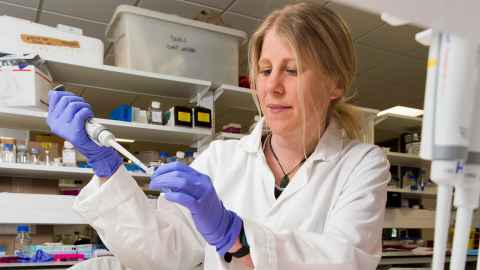Take 10 with... Jessie Jacobsen
Dr Jessie Jacobsen, School of Biological Sciences Rutherford Discovery Fellow, gives us 10 minutes of her time to discuss reading people like books, and the benefits of caffeine-fuelled meetings.

1. Describe your research topic to us ten words or less.
Understanding the genetic basis for neurodevelopmental conditions in NZ children. [InSCIde Scoop note: OK, we’ll have to permit the abbreviation for this one!]
2. Now describe it in everyday terms!
It’s actually very straightforward; we look for changes in the DNA of New Zealanders with developmental conditions to identify the underlying cause.
Much like proofreading a book, sequencing a person’s DNA enables us to read all the ‘words’ in these genes to see if any are spelled slightly differently – these then serve as road markers for understanding the underlying biology, which will hopefully lead to improved management of the condition.
3. What are some of the day-to-day research activities you carry out?
I spend time communicating with the families and clinicians involved in the research, and finding ways to fund more families to be sequenced.
One of my favourite parts of the day is meeting with our wonderful research team (made up of students and academics) to discuss and debate whether a genetic variant is causative, and how we might prove this.
4. What do you enjoy most about your research?
The discovery of a real and meaningful answer for a family.
5. Tell us about something that has surprised you in the course of your research.
I’m always surprised at how the best part of a whole day can disappear with a very enjoyable discussion on the genetic results for a case.
Our team all come to an answer via a different route, often in a way that had not even occurred to me. I’ve subsequently learnt to take coffee to these meetings! [InSCIde Scoop note: We can definitely get on board with coffee meetings… Your shout next time, Jessie?]
6. How have you approached any challenges you’ve faced in your research?
By enlisting others’ help – our brains are all wired differently, resulting in many different and surprising approaches to tackle a challenge. [InSCIde Scoop note: Collaborative working for the win! No one is an island, after all...]
7. What questions have emerged as a result?
How can we balance clinical need – especially turnaround time and actionable information – with the development of research methodology and approaches?
8. What kind of impact do you hope your research will have?
I hope our research will help improve the diagnosis for children with neurodevelopmental conditions, which in turn will result in improved management and more effectively targeted therapies for them.
9. If you collaborate across the faculty or University, or even outside the University, who do you work with and how does it benefit your research?
I have grown up in labs that collaborate widely; hence I work with many different researchers and clinical colleagues both locally and internationally.
On a daily basis I work closely with Professor Russell Snell and Associate Professor Klaus Lehnert from the School of Biological Sciences. The research simply wouldn’t exist without these collaborations – it’s also what makes the research so much fun and so enjoyable.
10. What one piece of advice would you give your younger, less experienced research self?
To enjoy being proven wrong.